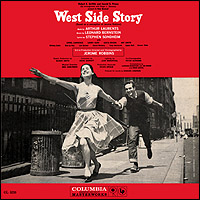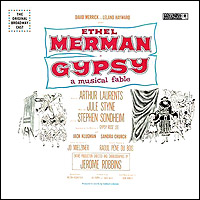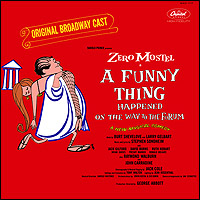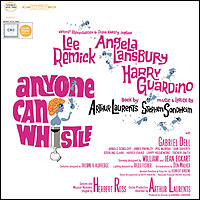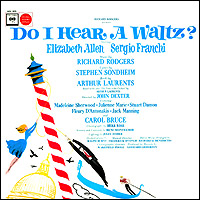*
Some clever person with too much time on his or her hands once compiled a list of ten books they'd chose to take with them to a desert isle. Ah, to sit on a desert isle with enough time on your hands to read! The modern counterpart would be a list of ten CDs; gee, which Sondheim musicals do you pick? Stephen Sondheim, as you might have heard, is having a birthday one of these days (March 22, to be exact). His 80th. Number 70 was celebrated with an exclusive fete thrown by the Music Division of the Library of Congress, which is where that list of "Songs I Wish I'd Written (At Least in Part)" came from. Number 75 had a gala at the New Amsterdam on 42nd Street and a 12-hour "Wall to Wall" concert at Symphony Space. For 80, there are three competing gala benefits spread over the next weeks — at the New York Philharmonic (March 15), the Roundabout (March 22) and City Center (April 26). It will be interesting to see which Sondheim stars appear and reappear, and who sings what how many times. I suppose someone has already gotten the jump on Sondheim's 85th, in 2015, so make your plans now.
My erstwhile editors, meanwhile, suggested that I take the opportunity to discuss Sondheim on CD. An exhaustive discussion of such would be — well, exhausting, because there is an endless array of material out there. Instead, we shall do a brief overview. Brief, in this case, looks like it will take about three columns. Ten CDs to take with you on a desert isle? How do you whittle Sondheim down to ten CDs? And don't you want to make room for at least something by other composers? Carousel, or She Loves Me? (Did someone say Mame?) Oh, well. We could restrict ourselves to ten Sondheim CDs, which would simplify matters; but even then, we would have to cut off Sunday in the Park to save The Frogs, or vice versa. So instead, I think I'd just take my iPhone, which already has most all the Sondheim CDs fit to hear. (It currently lists 2812 songs, although it seems odd to count the 29-minute fourth movement of Mahler's Sixth — i.e., "a piece of Mahler" — as one song.) So I'll take 'em all, and hope that my desert isle has a wall socket I can plug into. And Wi-fi. I never said a deserted desert isle; some place civilized, where you don't have to go out in the sun. Which makes all this moot, but allows us to tie up the intro and get to the discussion at hand.
*
One point needs first to be made. You have original cast albums, foreign cast albums, revival albums and studio casts. I could indeed go through and say that this one, or that one, is the very best of the lot; but that would mean diligently assembling and listening to each and every album, multiple times. Which I have not, and will not, do. Is the original Broadway cast album always going to be the best recording of a score? No, of course not; but in my experience, I most usually go back to the original. Here you have the show as performed when it was fresh and new and the creators — not just the composer but the rest of them — were standing in the back of the theatre (and often sitting in the control room of the recording studio). The performers were singing the songs the way the composer and/or director intended, at least within reason. (Some stars have been known to sing the songs the way they want to, maybe winning Tony Awards in the process.) But for the most part, you are getting what the composer intended. The singers have, by the time of the recording, been performing these songs for weeks; the arrangements were sometimes molded to their voice ranges and talents. What's more, songs added to the show during the tryouts and previews were often written specifically for that actor to sing in that role at that moment. Sondheim has been known to write songs — important songs — late in the game; these often suit the original performer especially well. And that's who you hear on the original Broadway cast album.
And then there's the band; once again, these were for the most part the same musicians who were playing the show nightly as it geared up for the Broadway opening. This was especially the case with the all-important reed section, where one musician might be assigned to play four or six or seven instruments in the course of the performance. If you know who your people are and what they do best, you will write to their talents — and assume that replacements will be able to play the same parts as well. (Here's a little secret: Broadway's top orchestrators often know their personnel before they write the charts. Having gone through numerous full scores, I can attest that Russell Bennett and Hans Spialek sometimes wrote on the parts not "Reed 1" and "Reed 2" but "Denti," "Peper," "Dale" — these being long-forgotten clarinet/flute/sax players who originated various classic musicals.) Further stacking the deck in favor of the original Broadway cast album is the practice of sweetening the band for the recording. Fabled record producers like Goddard Lieberson and Jay David Saks often talked their bosses into hiring extra players — usually strings — for the recording sessions of important musicals. So that the music on the cast album actually sounds richer and better than it did in the theatre, with the original orchestrators preparing the additional parts. None of this happens for foreign cast albums, revival albums, studio casts and the like. These later albums might well have better voices, or stars you want to hear, or other attributes; but the original Broadway cast album is — well, the original Broadway cast album.
So much for beginners. We can now move to the first show on our list,
West Side Story (1957). Some serious Sondheimites discount this one, along with
Gypsy, because Sondheim did not write the music. Nonsense; these are Sondheim shows as much as the others. Certainly if the lyrics for
West Side were by someone like Sheldon Harnick or Lee Adams, nobody would say — well, that's not really a Harnick show. The lyrics are by Sondheim; so, inevitably, are many of the choices made by the collaborators as they worked their way through.
West Side Story is such a classic that there isn't much to say about it, and the original cast album seems to be the way the score is supposed to sound. The composer made his own recording of the show in 1985; Bernstein had every right to cast it to his taste and change tempos at will, but I personally find it hard to listen to. The original 1957 album has a pair of lovers (Larry Kert and Carol Lawrence) who might not be the finest performers ever to sing the songs, but no matter. Chita Rivera, the Anita of the occasion, is unparalleled; the ensemble — especially the Jet boys — is lean and hungry and perfect; and the band matches the cast in electric excitement. Favorite moments: The Prologue, a prime example of a number that might well work better without its lyric ("how long does it take, to reach the moon-a-rooney?"); but the absent lyrics clearly were key to creation of the music. "The Jet Song," which was also extensively reworked. The yearning expressed in "Something's Coming," especially in the bridge ("around the corner, or whistling down the river"). The various sections of Bernstein's "Dance at the Gym." The two numbers that establish and cement the romance, "Maria" and "Tonight." "Cool," with pent-up excitement growing into that central fugue. The amazing Quintet — written as a quintet, but usually performed with the ensemble enhancing the principals. The Ballet, incorporating "Somewhere" and the nightmare. And Anita and Maria's dueling solos, "A Boy Like That" and "I Have a Love." As an aside, let us mention that the original cast album is discussed in detail — along with various stages of the creation of the show — in the new book, "Leonard Bernstein:
West Side Story" by Nigel Simeone. Published by the U.K. firm Ashgate, the book includes a full copy of the 1998 remastering of the original Broadway cast album, complete with liner note booklet. We come across so many "new" books about old musicals which seem to recycle what we've already read. This one tells us things we didn't know, which makes for fascinating reading.
If
West Side Story is one of Broadway's finest musicals with one of its finest scores,
Gypsy (1959) is, in my opinion, several pegs finer. Jule Styne was a supremely accomplished composer, both in Hollywood and on Broadway, with a tendency to find irrepressibly melodic tunes rolling off his fingertips. Working with Sondheim — 25 years younger and worlds apart in outlook and training — Jule seems to have been prodded into writing a somewhat different type of theatre score. Could it be that the likes of Sammy Cahn, Bob Merrill and Comden & Green were content to set whatever Jule turned out, while Sondheim listened and suggested and helped develop the tunes into more dramatic musical theatre songs? Whatever the reason,
Gypsy towers above Styne's other scores; most other Broadway scores, too. The reference above to original cast musicians who make a difference in the playing on the recordings can easily be applied to
Gypsy's trumpeter, a fellow named Dick Perry. He originated that famous trumpet solo in the overture, contributing some ad libs along the way (as called for); other good trumpeters have come along, but has anyone played
Gypsy like Perry? (The same can be said for his contributions to the overture on the original cast album of a subsequent Styne musical,
Funny Girl.) The excellent orchestrations to
Gypsy, by Sid Ramin and Red Ginzler, have never sounded as good on any subsequent
Gypsy, on recording or in the theatre, and for a very simple reason; the original charts seem never to have been used elsewhere. They were revised for touring purposes by unknown hands in 1960 or so, with a viola section added to what had been a violins-only orchestration. These new parts were created and duplicated for rental use, and have been heard in subsequent amateur and professional productions (including the several Broadway revivals of the show). The revised charts are fortunately very similar to the originals, with much of the show's vibrancy — and the unparalleled reed and brass writing — retained; but what you are hearing on all the revival cast albums is simply not the same as what they played when Merman was singing the show at the Broadway in 1959.
Fans of the various stars who have recorded the role of Rose over the years will compare one version over another; me, I'll stick to Ethel Merman. Favorite moments: The overture, which lifts the roof off the place like none other. "Some People," ditto. "Little Lamb," with its tenderly tentative orchestration. "You'll Never Get Away from Me," with its delicious reed embellishments. "If Momma Was Married," ditto the reeds. "All I Need Is the Girl," with that ethereally dream-like dance which builds to a frenzy. "Everything's Coming up Roses," which really does hit the heights in musical comedy power. I needn't go on to "Together," "Gimmick" and "Rose's Turn," need I?
A Funny Thing Happened on the Way to the Forum (1962), too, has never sounded the same; as with
Gypsy, the orchestrations were altered for post-Broadway use. In this case, they were significantly weakened. (Among other changes, they added violins to a show that originally didn't have them — a far more severe change than adding violas to
Gypsy.)
Forum, of course, was Sondheim's first Broadway musical with music by Sondheim; he logically enough enlisted
West Side orchestrators Sid Ramin and Irv Kostal to do the show. (Ramin did
Gypsy as well, though not with Kostal.) The originals still exist, but remain untouched. In 1996, however, Jonathan Tunick provided a new set for the Nathan Lane revival. I think it fair to say that
Forum doesn't compare to the best of Bernstein, Styne or Sondheim neither; the score is merely raucously funny. What's more, the original cast album contains inspired performances from Zero Mostel, Jack Gilford and David Burns. Favorite moments: "Comedy Tonight," that incisive and witty opening number. "Love I Hear," a sweetly innocent ballad buoyed by some lovely flute writing. "Free," the first of several tongue-twisting lyrics patterned into an unlikely duet. "Lovely," a romantic duet which is actually nothing but; it was written as a duet for two baggy-pants comedians (Pseudolus and Hysterium). When the creators couldn't decide on a suitable first act song for the lovers, Sondheim hit upon the idea of taking this second act duet and pre-reprising it. And it worked beautifully! "Everybody Ought to Have a Maid," a rollicking quartet that easily ranks high among low comedy songs. "Impossible," another unlikely duet carefully pieced together like a three-dimensional puzzle. "Bring Me My Bride" and "Funeral Sequence," two ludicrous songs that are uproariously funny in context.
With three hits in a row —
Forum surprisingly outran both
West Side and
Gypsy by half a year, although the earlier shows have had a much stronger after-life — Sondheim was ready to brave Broadway with
Anyone Can Whistle (1964), which the original ads labeled "A Wild Musical." Wild indeed, with a score that alienated a fair share of the audience but was, and remains, remarkable. The show keeps returning in various guises, looking to finally prove its worth; we shall get to see it once more on April 8, when City Center Encores! places it center stage. The original cast album was recorded despite the show's dire reception, and it's a mighty fortuitous thing it was — otherwise this amazing score might be known only from scratchy pirate recordings with blurry lyrics. Favorite moments: The Prelude, which sets things up askew. "Me and My Town," which immediately startles us (and with a Kay Thompson-style backup, no less). "Miracle Song," which continues in this vein. "Simple," a multi-part sequence running 13 minutes on the cast recording, which puts everything on its ear. "The opposite of left is right, the opposite of right is wrong, so anyone who's left is wrong. Right?" Simple? Not so. Angela Lansbury's "A Parade in Town" came along at the same time that Carol was singing "Before the Parade Passes By" and Barbra was singing "Don't Rain on My Parade." Which is your favorite? "Everybody Says Don't" and "I've Got You to Lean On" are both winning numbers; "The Cookie Chase" is, like "Simple," a wild, multi-part piece; and "With So Little to Be Sure Of" wraps things up on an ambivalent note with warm musical notes. Shining on the original cast album of
Anyone Can Whistle is Lansbury, everything she sings and says. She would go on to become a legendary Sondheim leading lady, but here in her first musical she was already as good as they come.
Whistle was a quickly-shuttered fiasco; what's more, the majority of the traditionalist audience seemed enraged by it. This in April, 1964; Sondheim would not see his next composed musical open until April, 1970. One Broadway opportunity came along in the interim, with his
West Side-
Gypsy-
Whistle librettist (Arthur Laurents) and yet another legendary Broadway composer, Richard Rodgers.
Do I Hear a Waltz? (1965) doesn't get much respect; the creators themselves were loath to praise it. I report that I nevertheless enjoy the cast recording quite a bit; it is possible, though, that if I had actually sat through the show in the theatre, I'd never have bothered listening to the recording. Favorite moments: the opening number, "Someone Woke Up," which builds and builds and features a shimmering orchestration (by Ralph Burns): welcome to Venice! "What Do We Do? We Fly!" is humorous, in what might seem like a pre-Sondheim manner. "Someone Like You," too, is a pleasing ballad which sounds little like Rodgers or Sondheim (and which is picked up, mightily, by the orchestration). Rodgers and Sondheim combine for two equally good songs of longing. "Here We Are Again" is sung by six of the principals; it began as an extended scene ("Promenade") of song fragments, in seven parts. When the tryout was savaged, the main song in the scene ("Two by Two") was ejected; "Here We Are Again" was written incorporating many of the existing fragments. After all of that, they came up with a song that works very nicely. "Take the Moment" is a booming ballad for the resident tenor, Sergio Franchi. Again, it is helped by the orchestrator, and it effectively brings down the first act curtain. "Moon in My Window" is the loveliest song of the show, a trio for the show's unrequited women. (Mr. Laurents did not write a happy story here.) Finally, "Do I Hear a Waltz?" makes a very nice title song, considering. This is not a great show or a good show, with little to recommend it. If Encores! wants to give it to us with Victoria Clark and Paolo Szot, though, all bets are on. I confess that I listen to the
Waltz cast album far more frequently than some of the other titles on my Rodgers and Sondheim shelves, so there! That takes Sondheim through the '60s, and through his 30s. Our next column will pick up with the Sondheim/Prince years.
*
Our last column discussed the highly successful 1952 revue, An Evening with Beatrice Lillie. I mentioned Lillie's duo-piano accompanists, Eadie & Rack (the married couple Eadie Griffith and Howard "Rack" Godwin). What I failed to mention was that when Eadie & Rack were unavailable for a 1956 Florida tour, Lillie instead took Kander & Pippin. That's right: Kander & Pippin. Lillie, who was growing somewhat confused, occasionally introduced them from the stage as Eadie & Rack. One night a lady in the first row asked, "Which is Eadie?" John pointed, helpfully, at Don.
(Steven Suskin is author of the recently released updated and expanded Fourth Edition of "Show Tunes" as well as "The Sound of Broadway Music: A Book of Orchestrators and Orchestrations," "Second Act Trouble" and the "Opening Night on Broadway" books. He can be reached at [email protected].)
